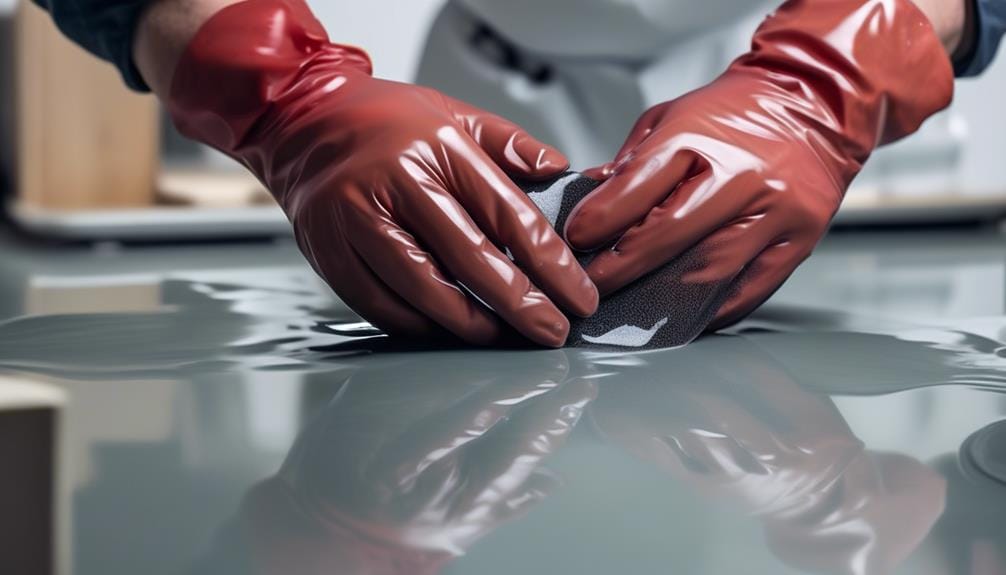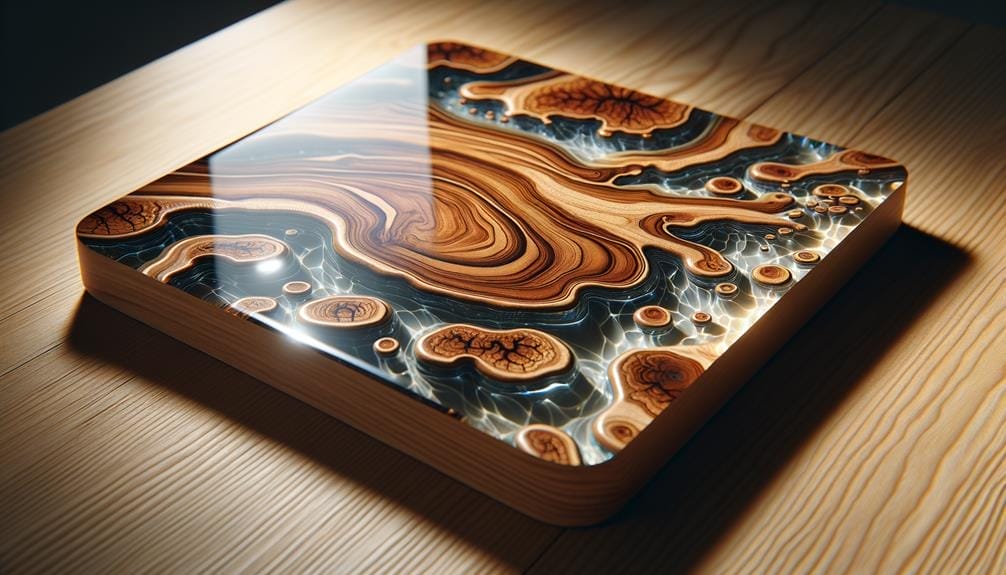Are you looking to keep your epoxy resin surfaces looking pristine and well-maintained? Wondering how to prevent damage and ensure longevity? Well, we’ve got some expert tips and tricks to share with you.
Have you ever wondered what the best way to clean and maintain epoxy resin surfaces is? Whether you’re a homeowner or a business owner, knowing how to care for these surfaces properly is key to preserving their beauty and functionality.
So, let’s dive into the world of epoxy resin maintenance and discover some valuable insights that will help you keep your surfaces in top-notch condition.
Key Takeaways
- Use a soft, non-abrasive cloth or sponge and mild soap to clean epoxy resin surfaces.
- Avoid harsh chemicals, abrasive cleaning agents, and excessive scrubbing to prevent damage.
- Clean up spills promptly using approved cleaning items like acetone or Crystal Simple Green®.
- Protect epoxy resin surfaces from excessive sun exposure, heat, and scratches with furniture pads and mats.
Cleaning and Maintenance Basics
To maintain your epoxy resin properly, it’s essential to follow a few basic cleaning and maintenance practices. Cleaning epoxy resin requires regular maintenance to ensure its longevity and optimal performance.
First and foremost, always use a soft, non-abrasive cloth or sponge to clean the surface. Avoid using harsh chemicals or abrasive cleaning agents, as they can damage the resin. Instead, opt for mild soap and warm water to gently clean the surface.
When cleaning epoxy resin, it’s important to avoid excessive scrubbing or rubbing, as this can cause scratches or dullness. Instead, use gentle circular motions to remove any dirt or grime. After cleaning, make sure to thoroughly rinse the surface with clean water to remove any soap residue.
Regular maintenance is crucial to keep your epoxy resin in top condition. This includes wiping up spills immediately to prevent staining or damage. Avoid placing hot objects directly on the resin surface, as extreme heat can cause it to warp or discolor. It’s also recommended to periodically apply a high-quality epoxy resin polish to enhance its shine and protect against UV damage.
Regular Maintenance Routine
To maintain the longevity of your epoxy resin surfaces, it’s crucial to establish a regular maintenance routine.
This routine should include cleaning techniques using approved cleaning items like acetone, paint thinner, and mild soap while avoiding wax or polish containing wax, abrasive pads, powders, or liquids.
Additionally, preventing yellowing is essential, so promptly clean up spills using appropriate cleaning items like acetone or Crystal Simple Green®.
Cleaning Techniques
For effective regular maintenance of your epoxy resin surface, it’s recommended to remove loose dirt and debris to prevent dulling the shine. Here are some cleaning techniques to keep your epoxy resin lab looking its best:
- Use warm water and gentle cleaning tools, such as a soft mop or microfiber cloth, for routine cleaning.
- Avoid harsh chemicals that can damage the resin, and opt for mild, neutral pH cleaners for tougher stains.
- Clean up spills promptly to prevent staining and ensure the longevity of your epoxy resin surface.
- Before applying any cleaning agents to the entire floor, always test them in a small, inconspicuous area to check for any adverse reactions.
To further protect your epoxy resin lab, consider using furniture pads, entryway mats, and rugs to prevent scratches and abrasions.
Preventing Yellowing
After ensuring the cleanliness of your epoxy resin surface, the next step in your regular maintenance routine is to prevent yellowing and discoloration. Yellowing can occur due to spills, stains, excessive sun exposure, and the use of certain cleaning products. To maintain the color and luster of your epoxy resin, follow these preventive measures:
| Preventive Measures | Description | Benefits |
|---|---|---|
| Regular Inspection | Regularly check the epoxy resin surfaces and joints for any signs of yellowing or discoloration. | Early detection allows for prompt action and prevents further damage. |
| Prompt Cleaning | Clean spills and stains promptly using approved cleaning items. Avoid using wax or polish containing wax, as it can lead to yellowing and damage. | Prevents the development of persistent stains and discoloration. |
| Gentle Cleaning | Use non-abrasive household cleaners and mild soap for routine cleanings. | Maintains the color and luster of the epoxy resin without causing damage. |
| Sun and Heat Protection | Protect the surfaces from excessive sun exposure and heat. | Prevents yellowing and discoloration caused by UV radiation and high temperatures. |
Preventing Damage to Epoxy Resin Surfaces
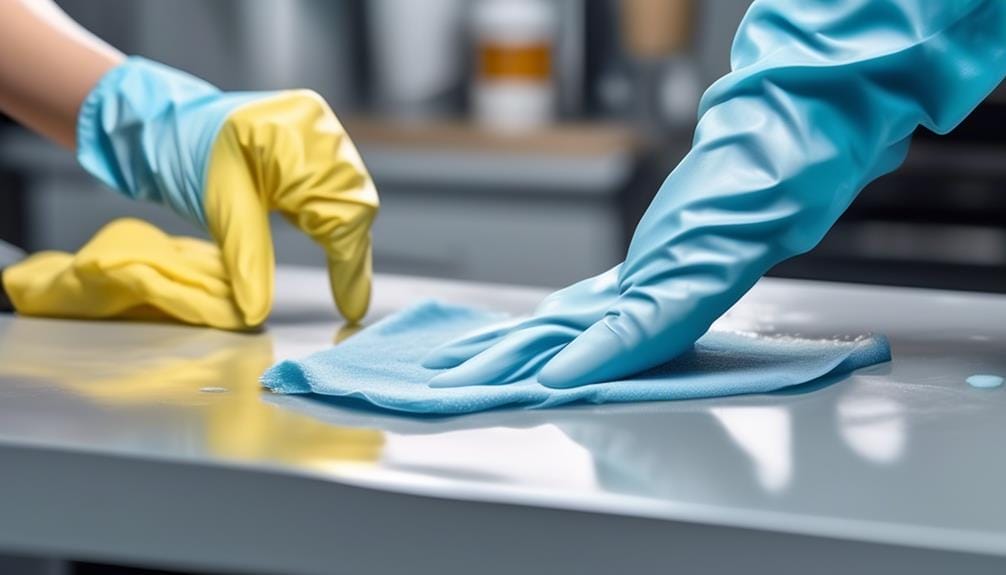
Regular inspections of all surfaces and joints are essential to prevent potential damage to epoxy resin surfaces. By conducting regular inspections, you can identify any signs of damage early on and take appropriate action to prevent further deterioration. Here are some important tips to help you protect your epoxy resin surfaces and prevent damage:
- Use approved cleaning items: When cleaning your epoxy resin surfaces, make sure to use approved cleaning items such as acetone, paint thinner, and specific cleaning pads. Using the wrong cleaning agents can dull the surface or even cause damage.
- Clean up spills promptly: Accidents happen, and spills on epoxy resin countertops are inevitable. However, it’s crucial to clean up spills promptly using appropriate cleaning agents. This will prevent the spills from seeping into the resin and causing staining or discoloration.
- Avoid abrasive materials: To prevent scratches and damage, avoid using abrasive pads, powders, or liquids on your epoxy worksurfaces or sinks. Instead, opt for gentle cleaning methods to maintain the integrity of the surface.
- Protect with furniture pads and mats: To prevent scratches, dents, and dirt accumulation, consider using furniture pads and entryway mats on your epoxy surfaces. These protective measures will help preserve the beauty and longevity of your epoxy resin surfaces.
Addressing Minor Issues
Now that you’ve learned how to prevent damage to epoxy resin surfaces let’s address the minor issues that may arise.
One common concern is scratches on the surface, which can be removed using specific techniques and products designed for epoxy.
Discoloration is another issue that can be effectively dealt with using approved cleaning materials and methods.
Scratch Removal Techniques
To address minor scratches on epoxy resin surfaces, you can use acetone or mild cleaning products to remove marring. Here are some scratch-removal techniques for epoxy resin countertops:
- Start with a soft cloth and the weakest cleaning solution.
- Progress to a stronger solution if the scratches persist.
- Use a white Light Duty Scotchbrite® pad moistened with the stronger solution if necessary.
Remember that scratches in epoxy resin are permanent but don’t affect performance. However, you can fill them in with a black permanent marker for aesthetic purposes.
When removing scratches, it’s important to avoid using wax or polish containing wax, abrasive pads, powders, or liquids. These can cause further scratching on epoxy worksurfaces or sinks.
Dealing With Discoloration
When it comes to addressing minor discoloration on epoxy resin countertops, there are effective techniques you can employ. Prompt cleaning using acetone or Crystal Simple Green® can help address the issue. Additionally, restoring the luster can be achieved by occasionally applying finish oil or Murphys Oil® to the work surface. It is important to conduct frequent inspections of sink areas and thoroughly clean sink surfaces and joints to prevent minor discoloration in Durcon epoxy sinks. If you notice any marring, start by using acetone or a mild cleaning product with a soft cloth, progressing as necessary. When cleaning and maintaining the color of epoxy countertops, Clorox wipes or baby wipes can be safer alternatives to disinfectant wipes. Take care of your epoxy resin countertops by following these maintenance tips to ensure they remain in top condition.
| Techniques | Products | Tips |
|---|---|---|
| Prompt cleaning | Acetone or Crystal Simple Green® | Clean as soon as discoloration is noticed |
| Restoring luster | Finish oil or Murphys Oil® | Apply occasionally for a glossy appearance |
| Frequent inspections | Thorough cleaning of sink areas | Prevent discoloration in Durcon epoxy sinks |
Removing Marring From Epoxy Resin
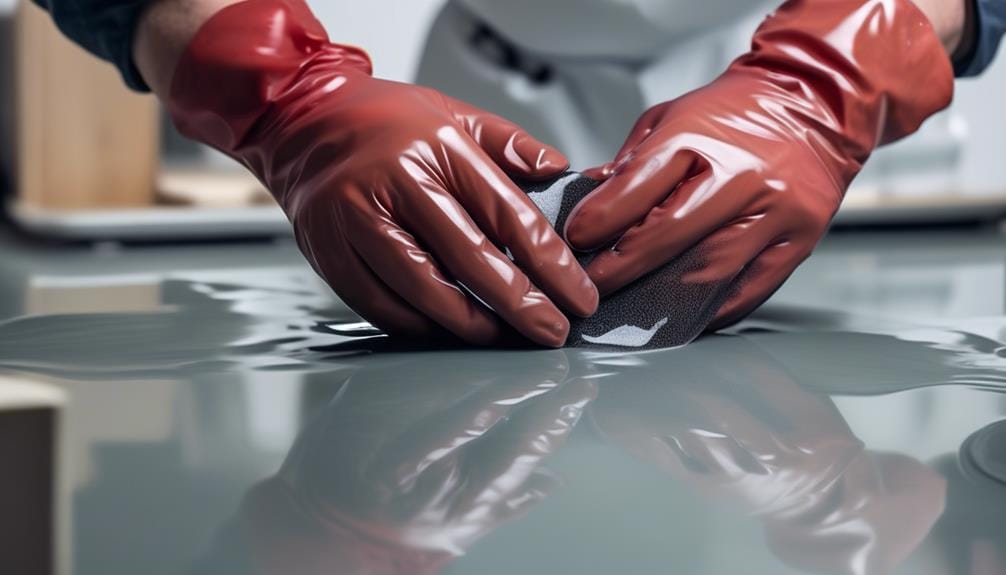
You can effectively remove marring from epoxy resin surfaces by using acetone or mild cleaning products. Here are some tips to help you clean and maintain your epoxy resin:
- Start with a soft cloth and gently rub the affected area. This may be enough to remove light marring.
- If the marring persists, moisten a white Light Duty Scotchbrite® pad with a stronger cleaning solution and lightly scrub the surface. Be careful not to apply too much pressure, as this may damage the epoxy resin.
- Scratches in epoxy resin are permanent, but you can try filling them in with a black permanent marker as an aesthetic remedy. Make sure to choose a marker that matches the color of your epoxy resin.
- Avoid using abrasives, wax-containing polishes, or alcohol-based cleaners on epoxy resin surfaces. These can cause damage or discoloration.
- Regularly inspect your epoxy resin surfaces and promptly clean up any spills to prevent stains from soaking into the countertop or other surfaces.
Dealing With Scratches on Epoxy Resin
To address minor scratches on epoxy resin surfaces, you can try repairing them yourself using a black permanent marker.
However, for a more professional and long-lasting solution, it’s recommended to prevent future scratches by using cutting boards, trivets, and coasters to protect the surface.
In case of deeper scratches or persistent marring, it’s advisable to seek professional scratch removal services to ensure the integrity and aesthetics of the epoxy resin.
Repairing Minor Scratches
To effectively repair minor scratches on epoxy resin surfaces, employ gentle cleaning solutions such as acetone or mild cleaning products. Here are some tips to help you restore the appearance of your epoxy resin:
- Start by using a soft cloth and a gentle cleaning solution to remove the minor marring on the surface.
- If the scratches persist, you can try using a slightly stronger solution and a soft cloth to buff the affected area gently.
- For more stubborn scratches, moisten a white Light Duty Scotchbrite® pad with a stronger solution and use gentle circular motions to remove the marring.
- Keep in mind that while scratches are permanent, they don’t impact the performance of the epoxy resin.
- To improve the aesthetics, you can fill in the scratches with a black permanent marker.
Preventing Future Scratches
To prevent future scratches on epoxy resin surfaces, regular inspections should be performed to address any existing scratches and prevent further damage promptly. Inspect the surface visually and run your hand over it to feel for any imperfections. If you notice any scratches, take immediate action to repair them.
Use non-abrasive cleaning materials to avoid scratching the surface, and avoid using harsh solvents that can dull or damage the epoxy resin. Clean spills immediately to prevent stains and potential scratching from debris. Consider using a black permanent marker to fill in scratches as a temporary aesthetic remedy.
Additionally, take precautions to avoid dropping heavy items on the surface, using sharp tools, or placing hot objects directly on the epoxy resin, as these actions can cause scratches and damage.
Professional Scratch Removal
If scratches occur on your epoxy resin surface, professional scratch removal may not always be possible, but there are temporary aesthetic remedies available. Here are some options to consider:
- Fill in the scratches with a black permanent marker: While this isn’t a permanent solution, it can help mask the appearance of the scratches and make them less noticeable.
- Use a glass cleaner for general cleaning: Standard glass cleaners like Windex can be used to clean epoxy resin surfaces. However, avoid using pure vinegar as it may damage the surface over time.
- Clean epoxy bar tops with warm water and mild soap: Start by using a mixture of warm water and mild soap to clean epoxy bar tops. If sanitizing is required, use a disinfectant spray or wipe to eliminate germs.
- Sanitize with rubbing alcohol: Rubbing alcohol with a concentration of 70% to 80% can effectively sanitize epoxy resin surfaces.
Treating Stained Epoxy Resin Surfaces
For effective treatment of stained epoxy resin surfaces, utilize approved cleaning items and follow proper maintenance procedures. Stains on epoxy resin surfaces can be unsightly and may compromise the overall appearance of your epoxy resin countertops or tables. However, with the right cleaning products and techniques, you can effectively treat these stains and restore the beauty of your epoxy resin surfaces.
To help you treat stained epoxy resin surfaces, here are some approved cleaning items that you can use:
| Cleaning Item | Purpose |
|---|---|
| Acetone | Thorough cleaning and stain removal |
| Crystal Simple Green® | Deep cleaning and stain removal |
| White Scotch Brite® Pads | Gentle scrubbing for stains |
| Finish oil (mineral oil) | Restoring shine and removing stains |
| Murphys Oil® | Cleaning and maintaining the surface |
When treating stained epoxy resin surfaces, it is important to conduct frequent inspections and promptly clean up any spills. For thorough cleaning, you can use acetone or Crystal Simple Green®. If marring or scratches persist, you can use a white Light Duty Scotchbrite® pad moistened with a stronger cleaning solution.
Special Care Considerations
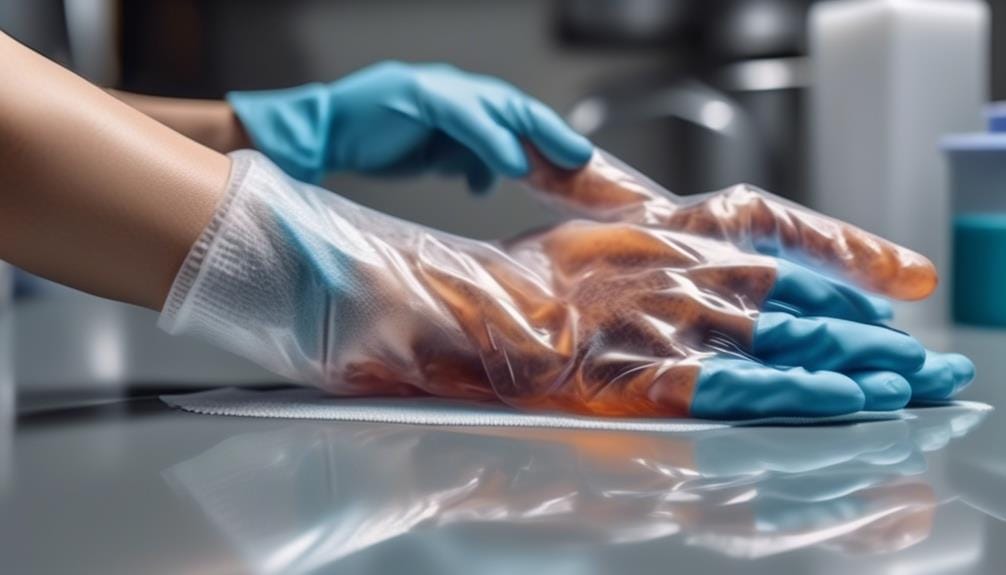
When it comes to maintaining the beauty and integrity of your epoxy resin surfaces, there are certain special care considerations that you should keep in mind. Here are some tips to help you take proper care of your epoxy resin surfaces:
- Protect from excessive sun exposure: Consider using shade or umbrellas to shield your epoxy tables from direct sunlight. Prolonged exposure to the sun’s UV rays can cause damage to the color and integrity of the epoxy surface.
- Prevent heat damage: Avoid placing hot objects directly on your epoxy tables. The intense heat can cause the resin to warp or discolor. To protect the surface, use heat-resistant materials such as trivets or coasters.
- Regularly inspect for damage: Take the time to check your epoxy tables for any chips, loose hardware, or signs of rust. Repair small chips or scratches promptly to prevent water damage and maintain the longevity of your epoxy surfaces.
- Gentle cleaning is key: Remove loose dirt and debris regularly by using a soft brush or cloth. For routine cleaning, use warm water and mild soap. Avoid using harsh chemicals or abrasive cleaners, as they can dull the shine of your epoxy floors.
Dos and Don’ts of Epoxy Work Surface Maintenance
To properly maintain your epoxy work surfaces, follow these dos and don’ts for effective and efficient upkeep.
- Conduct monthly close inspections of all surfaces, sinks, and joints to identify any issues early on. This will help you catch any cracks or pitted joints that may require immediate attention.
- Use approved cleaning items such as acetone, paint thinner, and mild soap for regular cleaning. These products will effectively remove dirt and grime without causing any damage to the epoxy surface. However, make sure to avoid using wax or abrasive pads as they can dull the surface over time.
In the event of spills on your epoxy resin countertops, it’s important to clean them up promptly using acetone or Crystal Simple Green®. These cleaners are effective in removing stains and spills without causing any harm to the epoxy surface.
- To restore the luster of your epoxy work surface, consider applying finish oil or Murphys Oil® occasionally.
When it comes to cleaning your epoxy resin countertops, it’s important to avoid using strong solvents, pure vinegar, or alcohol. These substances can cause damage to the surface. Instead, opt for non-abrasive household cleaners mixed with mild dish soap and water.
Frequently Asked Questions About Epoxy Resin Cleaning
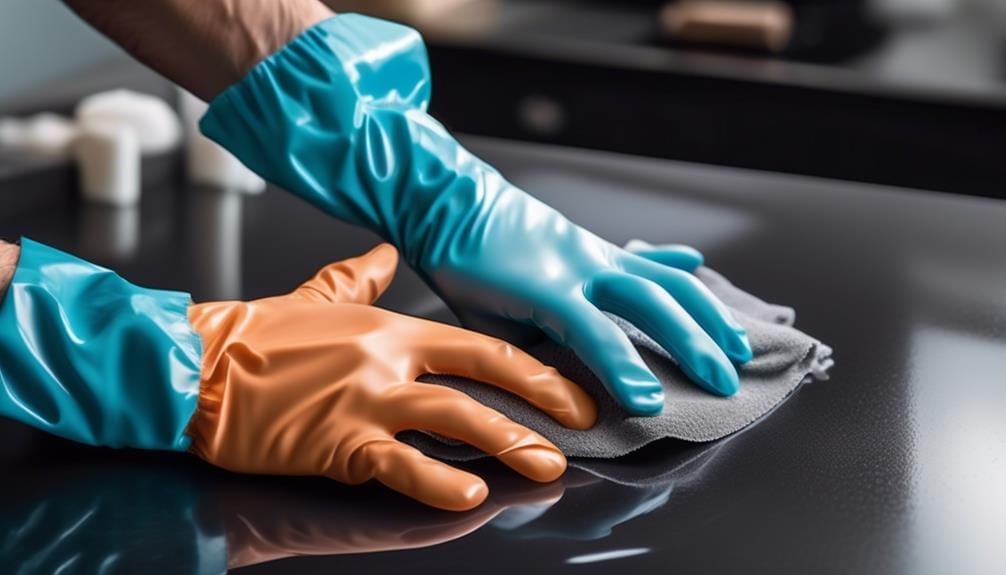
You may have questions about how to clean epoxy resin surfaces properly, so we’ve compiled some frequently asked questions to provide you with the information you need.
- What cleaning items are safe to use on epoxy resin surfaces?
Approved cleaning items for epoxy resin surfaces include acetone, paint thinner, Crystal Simple Green®, White Scotch Brite® Pads, finish oil, Murphys Oil®, clean rags or sponges, chamois cloth, mild soap, household cleaner, and two-part Smooth-On® epoxy grout. Avoid using wax or polish containing wax, abrasive pads, powders, or liquids on epoxy worksurfaces or sinks.
- How should spills on epoxy resin countertops be cleaned?
Promptly clean up spills on epoxy resin countertops using acetone or Crystal Simple Green® for thorough cleaning. This will help maintain the shine and longevity of the surface.
- What should be done if there are cracks or pits in sink areas and joints?
Conduct frequent inspections of sink areas and joints, and fill in cracked or pitted joints immediately with two-part Smooth-On® epoxy grout. This will prevent further damage and ensure the integrity of the surface.
- How can the shine and durability of epoxy resin flooring be maintained?
Regularly check and reapply sealant, quickly address spills, and dilute harmful substances with water to maintain the shine and longevity of your epoxy resin flooring. This will help protect the surface and keep it looking its best.
Expert Tips for Long-lasting Epoxy Resin Shine
For long-lasting shine and durability, proper maintenance of epoxy resin surfaces is essential. Here are some expert tips to help you maintain a long-lasting epoxy resin shine.
Regularly inspect and clean surfaces, sinks, and joints to prevent damage and maintain shine. Use approved cleaning items such as acetone, paint thinner, and specific cleaning pads to avoid dulling the surface.
Promptly clean up spills on epoxy resin countertops using approved cleaning products to prevent staining and damage. Conduct frequent inspections of sink areas and promptly address any issues, such as leaks or cracks, to prevent further damage to the epoxy resin surface.
Avoid using abrasive materials, wax-containing polishes, and pure vinegar for cleaning, as they can cause scratches and dullness on the surface. Instead, opt for mild cleaners specifically designed for epoxy resin surfaces.
Frequently Asked Questions
How Do You Care for Epoxy Resin?
To care for epoxy resin, clean it regularly using gentle cleaning techniques like wiping with a soft cloth and mild soap. Be aware of common problems like scratches and yellowing, and address them promptly to maintain the resin’s integrity.
Do You Need to Seal Epoxy Resin?
Yes, you should seal epoxy resin to enhance its durability and protect it from damage. Epoxy resin sealants provide benefits like improved resistance to stains, scratches, and UV rays. Avoid common mistakes like using too much sealant or not following the manufacturer’s instructions.
How Many Years Does Epoxy Resin Last?
Epoxy resin can last 20-30 years with proper care. Regularly inspect for cracks or chips and address them promptly. Clean with approved items like acetone or mild soap, avoiding wax or abrasive materials. Protect from sun and heat damage.
How Do You Protect Epoxy Resin?
To protect epoxy resin, you must be vigilant. Don’t fall for misconceptions about other sealants. Epoxy is strong and durable, but it still needs care. Regular cleaning and maintenance will ensure its longevity.
Conclusion
In conclusion, maintaining epoxy resin surfaces requires regular inspections, proper cleaning techniques, and preventive measures.
By following these tips and taking necessary precautions, you can ensure the longevity and shine of your epoxy resin surfaces.
Remember, ‘An ounce of prevention is worth a pound of cure.’
So, take care of your epoxy resin surfaces to avoid major damage and costly repairs in the future.

